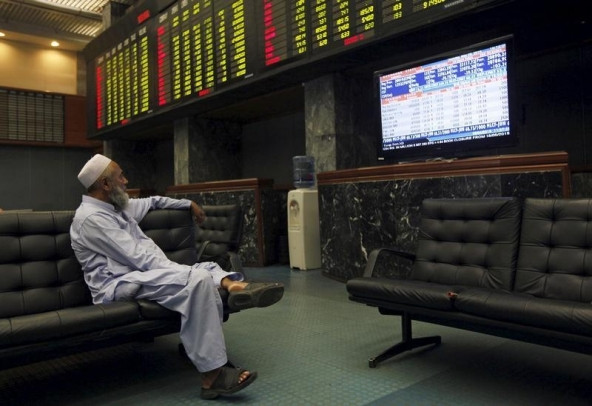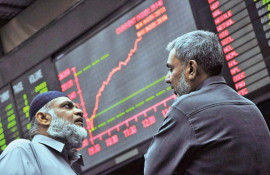
The bearish spell continued at the Pakistan Stock Exchange for a third day on Wednesday as weak economic cues played on investors’ mind and dragged the benchmark KSE-100 index lower.
Constant depreciation of the rupee against the US dollar coupled with concerns over the Financial Action Task Force’s (FATF) ongoing review of Pakistan kept market trading in a narrow range throughout the day.
Adding fuel to the fire, the impending gas shortage in the country took a toll on investor sentiment as the market expected the government to use expensive furnace oil to meet energy needs of the country, which would spark a fresh wave of inflation.
Earlier, trading began on a positive note, however, the lack of positive triggers pulled the KSE-100 index into negative territory within the first hour.
As uncertainty prevailed, the index oscillated between red and green zones throughout the day. The market saw significant profit-booking in the final hour and resultantly, it closed with a loss.
At close, the benchmark KSE-100 index recorded a decrease of 86.44 points, or 0.18%, to settle at 47,900.70.
Arif Habib Limited, in its report, stated that another range bound session was witnessed at the bourse, which ended in the red, after oscillating between -114 points and +148 points. It closed the session down by 86 points.
Selling pressure was evident across the board, barring exploration and production and refinery sectors, which maintained a positive momentum throughout the day.
The exploration and production sector, however, saw selling in the closing hour, which pushed stock prices below previous day’s closing levels.
Oil and Gas Development Company realised high volumes in anticipation of important decisions to be taken in the upcoming board meeting, the report said.
JS Global analyst Maaz Mulla said that bulls and bears clashed head-on, with the former taking charge in the first half of trading. However, bears made a comeback, pulling the KSE-100 down, which closed at 47,901 (-86 points).
Major contributors to the total volume of 619 million shares were Silkbank (-7.7%), WorldCall Telecom (0%), TPL Corp (+7.5%), Byco Petroleum (+1.4%), The Bank of Punjab (+2%) and Azgard Nine (+2.1%).
The finance minister agreed to extend 10-year income tax holiday to the existing refineries due to which National Refinery (+2.3%), Attock Refinery (+1.3%), Byco Petroleum (+1.4%) and Pakistan Refinery (+0.5%) closed in the green.
Furthermore, large steel producers and documented steel plants were planning to shut down their operations and go on a strike against the government policy of removing 17% federal excise duty (FED) on the erstwhile tribal areas in the federal budget for 2021-22.
Consequently, Mughal Iron and Steel Industries (-1.5%), International Steels (-1.1%) and Aisha Steel Mills (-2.7%) lost ground.
“Going forward, we expect volatility in the market due to the rollover week and recommend investors to view any downside as an opportunity to buy in construction and export-oriented sectors,” the analyst said.
Overall trading volumes increased to 619.1 million shares compared with Tuesday’s tally of 610.7 million. The value of shares traded during the day was Rs18.6 billion.
Shares of 420 companies were traded. At the end of the day, 192 stocks closed higher, 204 declined and 24 remained unchanged.
Silkbank was the volume leader with 52.3 million shares, losing Rs0.16 to close at Rs1.92. It was followed by WorldCall Telecom with 41.6 million shares, closing unchanged at Rs3.86 and TPL Corp with 33.9 million shares, gaining Rs1.13 to close at Rs16.21.
Foreign institutional investors were net sellers of Rs49.8 million worth of shares during the trading session, according to data compiled by the National Clearing Company of Pakistan.



1732256278-0/ellen-(1)1732256278-0-165x106.webp)
1725877703-0/Tribune-Pic-(5)1725877703-0-165x106.webp)












COMMENTS
Comments are moderated and generally will be posted if they are on-topic and not abusive.
For more information, please see our Comments FAQ